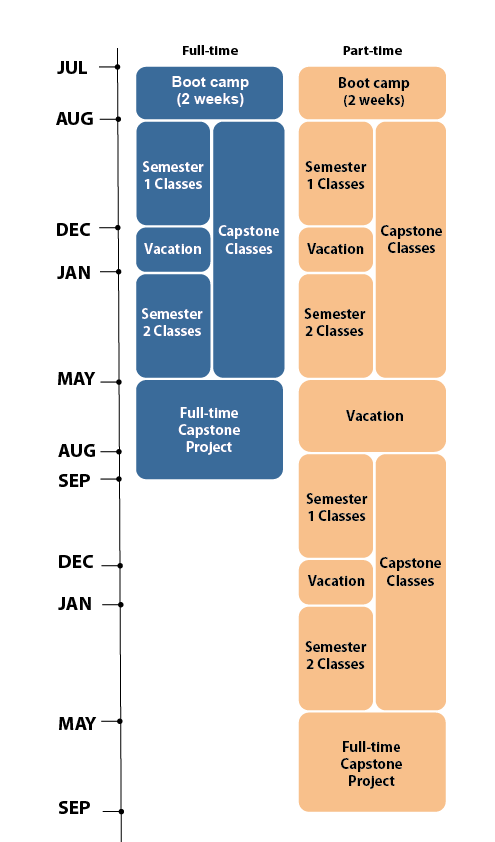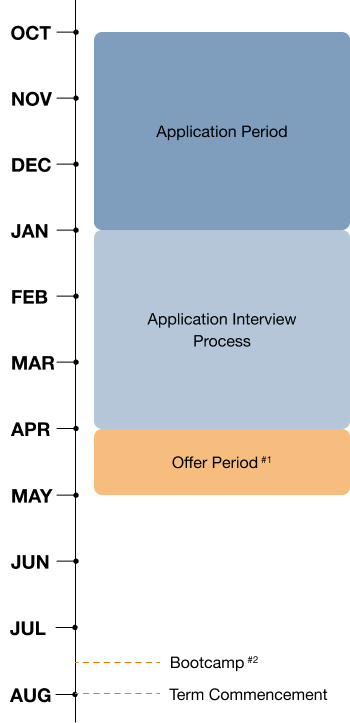
As Asia’s premier Master’s Programme in Business Analytics, we are dedicated to offering students a top-tier education that prepares them to thrive in the dynamic world of data analytics.
Our programme caters to a diverse range of individuals — whether you are a recent graduate eager to sharpen your analytical skills, a professional aiming to pivot into business analytics, or an industry expert seeking to deepen your expertise.
If you are driven by a passion to solve real-world business challenges using data analytics for positive impact, NUS MSBA is the right place to start.

The Professional Consulting Capstone Course will be a year-long course in the form of capstone classes, industry analytics seminars, and a 3 – 6 month full-time^ capstone project.
^Part-time students are recommended to do their capstone project with the company they are working for.
Students will complete 5 essential courses to build a cross-disciplinary foundation for Business Analytics and engage in rigorous study beyond the assumed disciplinary borders. This covers the interface between computer science, statistics, and other professional disciplines in the NUS Education framework.
Click on each of the essential course* below to find out more.
In this course, students will look at price formation, economic performance in imperfectly competitive markets, game theory, information economics, and empirical modelling.
In this course, students will learn about database concept, design and query as well as data warehousing concept, design and query.
This course focuses on model building, solution methods, and interpretation of results that are relevant to business decision making.
This course aims to provide a foundation for data analytics techniques and applications. It aims at:
(1) Emphasising on understanding of intuitions behind the tools, and not on mathematical derivations;
(2) Incorporating real-world datasets and analytics projects to help students bridge theories and practices; and
(3) Equipping students with hands-on experiences in using data analysis software to visualise the concepts and ideas, and also to practice solving problems.
The course covers commonly used analytics tools such as logistic regression and decision tree.
This course provides a general introduction to advanced data analytics methods. It is the sequel to the first foundation course and covers advanced decision tree techniques, support vector machine, unsupervised, semi-supervised and reinforcement learning.
In addition to essential courses, students are required to take three elective courses from at most two of the following vertical sectors.
These elective courses will help students delve deeper into understanding different analytic techniques required for specific industry sectors and build upon knowledge, concepts and skills learnt in essential courses. Through these elective courses, students innovate, devise and refine techniques and tools to solve complex problems.
Students who aspire to be a Business Analytics expert in other vertical sectors beyond the five below may take relevant advanced courses from the respective participating faculties, subject to approval by the Academic Committee.
Click on each of the elective vertical sectors* below to find out more.
Big Data Analytics Technology
Students learn to analyse data that cannot fit in the computer’s memory and apply such analysis to web applications. Topics include map-reduce as a tool for creating parallel algorithms that operate on very large amount of data, similarity search, data-streaming processing, search engine technology, and clustering of very large high-dimensional datasets.
Cloud Computing
Students gain an overview of the design, management and application of cloud computing. Topics include managing virtualisation, cloud computing environments, cloud design patterns and use cases, data centre architectures and technologies, cloud services fulfilment and assurance, orchestration and automation of cloud resources, cloud capacity management, cloud economics, case studies.
Neural Networks and Deep Learning
Students gain knowledge of deep neural network and the ability to apply deep learning methods effectively on real world problems. Students design, develop and evaluate deep learning-based solutions to practical problems, such as in the areas of computer vision, bioinformatics, fintech, cybersecurity and games.
Hands-on with Business Analytics (Consumer)
Students learn all stages of an analytics project from design, data collection, execution and presentation. Students use technical tools and statistical methods through the data pipeline in an organisation, with emphasis on techniques for causal analysis and econometric identification. Students present their projects at a public event open to peers, faculty, investors and industry experts.
Introduction to Network Science & Analytics
This course aims to introduce students to the field of Network Science & Analytics, which is rapidly emerging at the confluence of network theory, statistical analysis and business intelligence. Students learn a combination of network fundamentals, hands-on experience with computational techniques and datasets, and exposure to business applications.
Fintech, Enabling Technologies and Analytics
Students learn current developments in fintech and relevant technologies through real word case studies and technologies used in the industry such as blockchain and artificial intelligence (AI).
Quantitative Risk Management
Students learn probability and statistical methods used by financial and non-financial institutions to model market, credit and operational risks. Topics covered include loss distributions, multivariate models, dependence and copulas, extreme value theory, risk measures, risk aggregation, risk allocation and supply chain risk management.
Economic Methods in Healthcare Technology Assessment
Students learn how they may conduct their own research and understand research by others with Health Technology Assessment (HTA). This module also includes health econometrics, cost-effectiveness and economic evaluation in healthcare, and conjoint analysis.
Analytics For Better Health
Students gain insights to healthcare analytics, including both clinical-related and healthcare operations related analytics, and how they can select the right techniques to solve relevant problems.
Information Technology in Healthcare
Students learn the use of Information Technology (IT) in Singapore healthcare and how they can successfully manage and evaluate IT projects in their workplace.
Applied Regression Analysis
This course uses multiple regression, model diagnostics, remedial measures, variable selection techniques, non-least squares estimation, non-linear models, one and two-factor analysis of variance, analysis of covariance, and linear model as special case of generalised linear model.
Survival Analysis
This course covers probability models for survival times, graphical procedures, inference procedures, parametric and non-parametric models, cox proportional hazards model, regression models for grouped data, Bayesian predictive distributions.
Deep Learning in Data Analytics
This course provides a comprehensive understanding of cutting-edge deep learning models and the core statistical concepts behind their successful applications to a wide range of machine learning problems.
*This list is not exhaustive and subject to change.


*GRE/GMAT is highly recommended from AY2025/26 onwards.
August Intake (AY 2026/27)

#1 Acceptance fee has to be paid within 7 working days upon offer.
#2 Bootcamp begins 2 weeks before term starts.
Timelines are indicative only. Applications are assessed on a rolling basis, and interview or offer dates may vary.
Only online applications will be accepted.
Tuition fee for Academic Year (AY) 2026/27 intake:
Application fee: S$100
NUS Alumni: S$68,000*
Singaporeans and PRs: S$76,500*
International students: S$85,000
The cost of travel, accommodation and miscellaneous expenses are not included and are to be borne by the participant.
For an estimated cost of living, please visit the Cost of Living Calculator for more information.
Students are required to make an upfront payment of SGD $10,900 (included in the tuition fees) upon acceptance into the programme, which is non-refundable and non-transferable.
| Full-Time Students | NUS Alumni | Singaporean and PRs | International Student |
|---|---|---|---|
| Total Programme Fees (Inclusive of 9% GST) | S$68,000 | S$76,500 | S$85,000 |
| Acceptance Fee | S$10,900 | S$10,900 | S$10,900 |
| Semester 1 | S$23,100 | S$27,350 | S$31,600 |
| Semester 2 | S$34,000 | S$38,250 | S$42,500 |
| Full-Time Students | NUS Alumni | Singaporean and PRs | International Student |
|---|---|---|---|
| Total Programme Fees (Inclusive of 9% GST) | S$68,000 | S$76,500 | S$85,000 |
| Acceptance Fee | S$10,900 | S$10,900 | S$10,900 |
| Semester 1 | S$6,100 | S$8,225 | S$10,350 |
| Semester 2 | S$17,000 | S$19,125 | S$21,250 |
| Semester 3 | S$17,000 | S$19,125 | S$21,250 |
| Semester 4 | S$17,000 | S$19,125 | S$21,250 |
Important things to note:
Students will also be charged a miscellaneous fee in their student bill. Miscellaneous student fees help meet costs incurred by the University in providing services to the student community that are either not covered or only partially covered by the tuition fee and government subsidy. These services include healthcare for students; facilitating student cultural, social and recreational programmes; and maintaining the shuttle bus service, IT network and other essential campus infrastructure and services.
All students, whether registered on a full-time or part-time basis, are charged the miscellaneous student fees. These are due at the same time as the tuition fees. The miscellaneous student fees payable are set out here.
Taking the NUS MSBA programme is an important decision in your life. We have a number of merit-based scholarships to help you in transforming your personal and professional life.

At NUS BAC, we offer two merit-based scholarships to support outstanding candidates in the NUS MSBA programme. Interested candidates may apply for these scholarships after completing their admission application. Only one scholarship may be awarded to each eligible candidate, and the scholarship cannot be combined with other rebates, scholarships, corporate sponsorships, or financial awards.
Only fully completed applications with all required fields and supporting documents will be assessed for the NUS BAC Scholarships. Incomplete applications will not be considered. Only successful scholarship applicants will be notified, and scholarship outcomes will be communicated together with the admission offer.
The scholarship application deadline for AY2026/2027 intake is 15 December 2025. All scholarship decisions are made at the discretion of NUS BAC and are subject to change. Decisions are final and not subject to appeal.
The Merit BAC Scholarship is open to Singapore Citizens and Singapore Permanent Residents. Each scholarship is valued at S$30,000. It is awarded based on merit, taking into consideration the candidate’s academic excellence, professional achievements, and leadership potential. Interested candidates may apply for the scholarship through the GDA3 platform after completing their admission application.
The Global BAC Scholarship is open to international candidates. Each scholarship is valued at S$30,000. It is awarded based on merit, taking into consideration the candidate’s academic excellence, professional achievements, and leadership potential. Interested candidates may apply for the scholarship through the GDA3 platform after completing their admission application.
The SG Digital Scholarship (Postgraduate) is an industry scholarship that empowers individuals interested in pursuing tech or media-related studies at the Master’s or PhD level. Individuals pursuing postgraduate studies in specialised tech or media-related areas such as Artificial Intelligence, Analytics, Quantum Technologies, Immersive Media, and Film Studies can chart their future with this scholarship.
To find out more about your eligibility and how to apply for this scholarship, please visit here.
The objective of the Financial Training Scheme (FTS) is to encourage the development of financial sector expertise by providing financial support for programmes which aim to enhance the skills and capabilities of the Singapore financial sector workforce. It encourages the acquisition of work skills to enter new or developing business areas, or in developing more sophisticated or specialist skill sets.
Learn more about the FTS here.
The Institute of Banking Financial Standards Trading Scheme (IBF-STS) provides financial support for training and assessment programmes accredited under the IBF Standards. The IBF Standards is a structured competency framework that sets out benchmarks for professional achievement to raise the standard of Singapore’s financial services workforce and training providers. Training and assessment programmes under the IBF Standards are accredited by the Institute of Banking and Finance. These programmes provide job-specific and practice-oriented training that are benchmarked to international standards.
Learn more about the IBF-STS here.
The MOH Holdings (MOHH) Healthcare Scholarships is awarded to local undergraduates and graduates who have a passion for contributing to Singapore’s public healthcare sector. The scholarship will provide fresh graduates rewarding and challenging careers via a structured job exposure programme and aims to groom the next generation of leaders in the healthcare industry.
Eligible applicants who are admitted to the MSBA programme and interested in Healthcare Data Analytics area are eligible to apply for MOHH Health Graduate Studies Award (HGSA). The HGSA is offered to final year undergraduates or recent university graduates who are keen to pursue a Masters degree in selected health science or healthcare-related disciplines: Medical Informatics and Data Analytics.
To find out more or to apply for HGSA, please visit here.
Set up in 1991 by the Tanjong Pagar Citizens’ Consultative Committee with funding from the public to commemorate the contributions made by Mr Lee Kuan Yew to Singapore, the Lee Kuan Yew (LKY) Scholarship marks Singapore’s continuous effort to recognise outstanding individuals with the aptitude and inclination to contribute to our society.
Since its inception, many LKY Scholarship holders have gone on to make significant contributions across various fields including the Public Service, business, law, consulting, healthcare, the arts, and academia.
Learn more about The Lee Kuan Yew Scholarship here.
The CIMB ASEAN Scholarship is committed towards helping young talent in need to realise their dreams. Going beyond financial support, the Scholarship programme provides exciting professional development and a mentor support system designed to empower the region’s young talent to turn their lives around and make a difference for those around them.
In recognising the evolving nature of the banking industry, CIMB welcomes applicants from a wide variety of academic disciplines such as applicants studying Computer Science, Data Science and Psychology, apart from degrees traditionally associated with a career in banking such as Accounting, Economics, Finance.
To find out more, please visit here.
The application deadline for NUS MSBA AY2026/2027 intake is 31 January 2026.
The application deadline for BAC Scholarships is 15 December 2025.
Check out our Application Checklist and ensure you have all the application materials ready.
Please note that your application will be considered complete only after the application fee has been paid.
You will need an account to start your online application. You can use this account to save your progress and return later to complete the application.
Please login to your account to continue with your application. Please save your application form regularly to prevent any loss of information.
© National University of Singapore. All Rights Reserved.